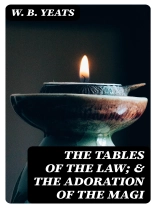In 'The Tables of the Law; & The Adoration of the Magi, ’ W. B. Yeats presents a rich tapestry of poetry that interweaves mythology, philosophy, and the spiritual tumult of the modern age. The collection is marked by Yeats’s characteristic blend of lyricism and dramatic narrative, exploring the intersections of ancient wisdom and contemporary existential dilemmas. Rooted in a literary context that engages with both the Symbolist movement and Irish nationalism, the poems reflect Yeats’s profound belief in the transformative power of art and the metaphysical, inviting readers to ponder the nature of truth, morality, and the divine through a symbolic lens reminiscent of medieval allegory. W. B. Yeats, a towering figure of 20th-century literature and a key player in the revival of Irish culture, drew heavily on his deep interest in mysticism, folklore, and occult traditions while crafting this work. His philosophical engagements with theosophy and his role in the Irish Literary Revival instilled in him a sensitivity towards the metaphysical undercurrents of life and history, which prominently pervades the verses within this collection. Such backgrounds illuminate his exploration of human desire and spiritual yearning. This book is essential for readers interested in the confluence of mysticism and literature, as it offers a unique glimpse into Yeats’s introspective quest for meaning amidst chaos. Readers seeking to understand the depth of human experience through Yeats’s visionary framework will find 'The Tables of the Law; & The Adoration of the Magi’ both enlightening and deeply resonant.
O autorze
William Butler Yeats, born on June 13, 1865, in Sandymount, Ireland, stands as a towering figure in 20th-century literature, blending the realms of poetry and playwriting with a distinctive literary style deeply rooted in the rich soil of Irish folklore and mythology. A Nobel laureate in Literature (1923), Yeats’ work encompasses a vast exploration of human experience, history, and the mystical. Principally among his works, 'The Tables of the Law; & The Adoration of the Magi’ (1897), offers insight into his esoteric interests and symbolist tendencies. His storytelling in this volume is imbued with spiritual undertones, reflecting his preoccupation with the otherworldly and the transcendental. Yeats’ verse is often characterized by a lyrical quality and a rhythmic structure that echo the cadences of the Irish oral tradition, revealing his lifelong fascination with folklore and the occult. This particular book exemplifies his early literary style, which later evolved to incorporate modernist sensibilities. His contribution to literature continued until his death on January 28, 1939. Yeats’ body of work, extending far beyond 'The Tables of the Law; & The Adoration of the Magi’, continues to be celebrated for its artistic vigor, its intellectual depth, and its profound influence on both contemporary and future generations of writers.












